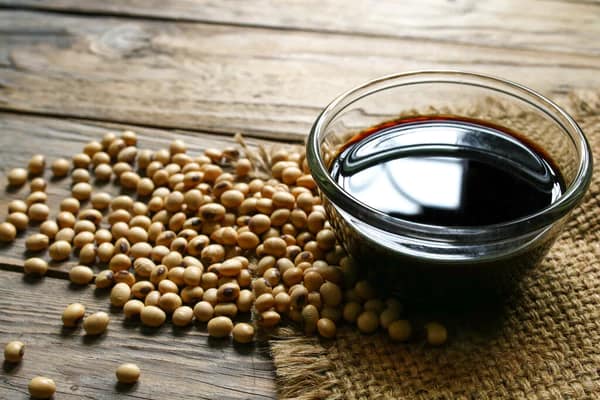When it comes to adhering to a vegan lifestyle, it’s important to carefully consider the ingredients in the foods we consume. One common question that arises is ‘’Is Soy Sauce Vegan or not?’’. As a vegan myself, I understand the need for clarity on this issue and have delved into the topic to provide you with an informed answer.
The problem statement here is that some individuals may be unsure whether soy sauce aligns with their vegan values due to concerns about its ingredients or production process. The solution lies in examining the ingredients and production methods of soy sauce to determine its vegan-friendliness.
In my personal experience, I have encountered situations where dining out or purchasing store-bought soy sauce led to uncertainty about its vegan status. This prompted me to research and learn more about the topic, ensuring that I could confidently make choices that align with my ethical beliefs.
To find an answer, I will delve into the world of soy sauce, exploring its origins, traditional production methods, and potential non-vegan ingredients that may be present in certain varieties. By doing so, we can gain a comprehensive understanding of whether soy sauce can be considered vegan-friendly.
What Is Veganism?
Before I tell you if soy sauce is vegan, let me explain what veganism is. Veganism is a lifestyle and dietary choice that seeks to exclude the use of animal products in all aspects of life. This means that vegans do not consume meat, poultry, fish, dairy products, eggs, honey, or any other animal-derived ingredients. Additionally, vegans also avoid using products that are tested on animals or made from animal by-products, such as leather or fur.
Is Soy Sauce Vegan?
Now heading towards our main concern, let’s dive into the question of whether soy sauce is vegan. As a vegan myself, I understand the importance of knowing which foods align with a vegan lifestyle. Soy sauce is a popular condiment used in various cuisines worldwide, and it plays a significant role in enhancing the flavors of many dishes. However, its vegan status may be questionable to some due to its production process.
Overview Of Soy Sauce Production Process
Traditional soy sauce is made by fermenting soybeans, wheat, water, and salt. The fermentation process breaks down the proteins and carbohydrates in soybeans and wheat into amino acids and simple sugars. The resulting liquid is then strained and bottled as soy sauce.
While this process seems vegan-friendly, the potential issue lies in the use of wheat. Some brands of soy sauce use wheat as an ingredient, making them unsuitable for individuals with gluten intolerance or those following a gluten-free diet.
However, there are also gluten-free soy sauce options available that replace wheat with alternative ingredients like rice or tamari sauce (made solely from fermented soybeans). Therefore, if you are a vegan who doesn’t have gluten intolerance or follow a gluten-free diet, traditional soy sauce should be suitable for your dietary preferences. Nonetheless, it’s essential to check the ingredients list or opt for gluten-free alternatives to ensure it aligns with your specific dietary needs.
Nutritional Value
| Calories | 10 |
| Total Fat | 0g |
| Saturated Fat | 0g |
| Trans Fat | 0g |
| Cholesterol | 0mg |
| Sodium | 920mg |
| Total Carbohydrate | 2g |
| Dietary Fiber | 0g |
| Total Sugars | 0g |
| Protein | 1g |
Types Of Soy Sauce: Traditional, Dark, Light, And Tamari

Now you know if soy sauce is suitable for you, let’s dive into the different types of soy sauce available: traditional, dark, light, and tamari. As a food lover, I have had my fair share of experiences with these various soy sauce varieties, and I’m excited to share them with you!
Traditional Soy Sauce
Traditional soy sauce is the most common type found in Asian cuisines. It is made from fermented soybeans, roasted grains (such as wheat or barley), water, and salt. The fermentation process can take several months to years, resulting in a rich and complex flavor profile. Traditional soy sauce has a deep umami taste with a slightly sweet and salty balance. It is commonly used as a dipping sauce or for marinating meats and vegetables.
Dark Soy Sauce
Dark soy sauce is similar to traditional soy sauce but undergoes a longer fermentation process and contains molasses or caramel for added color and sweetness. It has a thicker consistency and a more intense flavor compared to traditional soy sauce. Dark soy sauce is often used in braising, stir-frying, and adding depth to sauces and gravies. Its robust flavor can enhance the richness of dishes like noodles or fried rice.
Light Soy Sauce
Light soy sauce, also known as thin or regular soy sauce, is lighter in color and less viscous than traditional soy sauce. It is made from a shorter fermentation period and has a milder taste. Light soy sauce is commonly used for seasoning dishes during cooking or as a table condiment for dipping. Its lightness allows it to add flavor without overpowering the other ingredients.
Tamari
Unlike the Maruchan, the Tamari is a type of soy sauce that originated from Japan. It is traditionally made without wheat, making it gluten-free. Tamari has a rich, full-bodied flavor with less saltiness compared to other soy sauces. It is often used as a dipping sauce or as a gluten-free alternative in recipes. Tamari’s distinct flavor complements sushi, sashimi, and other Japanese dishes.
In my personal experience, I have found that traditional soy sauce is versatile and can be used in a wide range of dishes, from stir-fries to marinades. Its complex flavor adds depth to the overall taste of the dish.
Dark soy sauce, on the other hand, is excellent for adding a deep color and intense flavor to braised meats and stews. Light soy sauce is my go-to for everyday cooking, as it provides a balanced seasoning without overpowering the other ingredients. As for tamari, I appreciate its gluten-free nature and unique flavor, which pairs well with Japanese cuisine.
Common Brands And Their Vegan Certifications

If you are looking for vegan soy sauce, there are several common brands that offer vegan certifications for their products. Here, I will discuss three of these brands and their vegan certifications in short detail.
San-J Soy Sauce
San-J is a well-known brand that offers a variety of soy sauces, including their popular Tamari Soy Sauce. Their products are certified vegan by the Vegan Action organization, which ensures that the soy sauce does not contain any animal-derived ingredients or by-products.
Kikkoman Soy Sauce
Kikkoman is a globally recognized soy sauce brand, and their products have been enjoyed for centuries. They offer a vegan-friendly version of their classic soy sauce, which is certified by the Vegan Society, one of the most respected vegan certification organizations worldwide. This certification ensures that Kikkoman’s vegan soy sauce is free from any animal-derived ingredients or by-products.
Laoganma Soy Sauce
Laoganma is a Chinese brand known for its flavorful and authentic soy sauces. Their vegan-certified soy sauce is approved by the China Vegetarian Association (CVA), which is a well-respected organization that ensures the product meets strict vegan standards. This certification guarantees that Laoganma’s vegan soy sauce does not contain any animal-derived ingredients or by-products.

Tips For Choosing Vegan Soy Sauce
Lastly, when choosing vegan soy sauce, it is essential to consider the ingredients and production process. Here are some tips to help you make the best choice:
Check the ingredients
Always read the label to ensure the soy sauce is made from non-GMO soybeans and does not contain any animal-derived ingredients, such as whey or fish. Look for soy sauce labeled as “vegan” or “organic” to be extra cautious.
Look for a certified vegan label
Many soy sauce brands are certified vegan by organizations like the Vegan Society or the Vegetarian Resource Group. This certification ensures that the product meets strict vegan standards and is free from animal-derived ingredients.
Avoid hydrolyzed soy protein
Some soy sauces contain hydrolyzed soy protein, which is derived from soy protein isolates. This ingredient may be processed using animal-derived enzymes, so it’s best to avoid products that contain it.
Choose a darker soy sauce
Dark soy sauces tend to have a thicker consistency and a milder flavor than light soy sauces. They are less processed and often contain more soybeans, making them a better choice for vegans.
Opt for tamari soy sauce
Tamari soy sauce is made using a higher proportion of koji (a type of fungus) to soybeans, resulting in a sauce that is naturally gluten-free and lower in sodium. It is also less likely to contain wheat, which is often used as a processing aid in traditional soy sauce production.
Research the brand’s production practices
Some soy sauce brands like Amoy or Aldi may use animal-derived ingredients in their production process, even if they do not contain any animal-derived ingredients in the final product. Research the brand’s production practices to ensure they are vegan-friendly.
Consider the taste
Different soy sauces have distinct flavors and aromas. Experiment with various types to find the one that best suits your taste preferences and culinary needs.
Conclusion
In conclusion, soy sauce can be considered vegan-friendly. As a popular condiment, it has been widely used in various cuisines around the world. While traditional soy sauce is typically made from fermented soybeans, wheat, water, and salt, there are also variations that are gluten-free and made solely from soybeans. Therefore, individuals following a vegan or plant-based diet can enjoy soy sauce without any animal-derived ingredients.
During my research, I came across several personal experiences that highlight the vegan-friendly nature of soy sauce. Many vegans have shared their positive encounters with using soy sauce in their cooking and dining experiences. They have found it to be a versatile and flavorful addition to their meals. Some individuals have even mentioned using it as a substitute for other non-vegan condiments, such as fish sauce or Worcestershire sauce.
Furthermore, the availability of certified vegan soy sauce brands has made it easier for vegans to choose products that align with their dietary preferences. Brands like Yamasa, Waitrose, or Tesco ensure that no animal products or by-products are used in the production process. By opting for these certified options, vegans can confidently enjoy the rich umami flavor that soy sauce adds to their dishes.
FAQs
Why Is Soy Sauce Not Vegan?
Soy sauce is not always vegan due to the presence of wheat in some varieties, which may be processed using bone char, making it non-vegan.
Is Kikkoman Sauce Vegan?
Kikkoman soy sauce is vegan, as it does not contain any animal-derived ingredients.
Is Soy Always Vegan?
Not all soy sauce is vegan, but most regular and dark soy sauces are vegan-friendly.
Can Vegans Drink Soy?
Yes, vegans can drink soy milk, which is a popular plant-based milk alternative.
Is All Soy Sauce Vegan?
Not all soy sauce is vegan, but most regular and dark soy sauces are vegan-friendly.
Is Dark Soy Sauce Vegan?
Yes, dark soy sauce is vegan, as it contains no animal-derived ingredients.
Is Soy Sauce Vegetarian Friendly?
Yes, soy sauce is vegetarian-friendly, as it does not contain any animal-derived ingredients.
Is Vegan Soy Sauce Halal?
Vegan soy sauce can be halal, as it does not contain any animal-derived ingredients.
Is Light Soy Sauce Vegan?
Light soy sauce is generally vegan, as it does not contain any animal-derived ingredients.
Is Soy Sauce Vegan And Gluten-Free?
Soy sauce can be both vegan and gluten-free, but it depends on the brand and the ingredients used.






